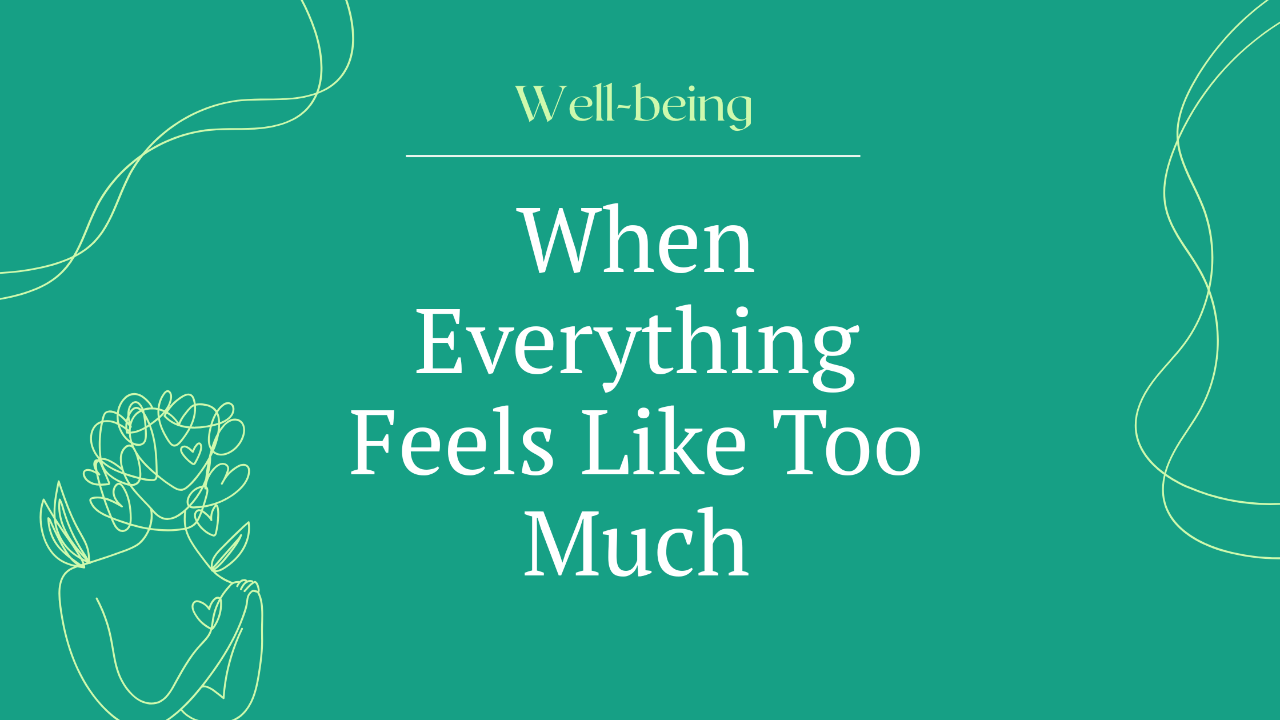✨ When Everything Feels Like Too Much
Oct 02, 2025
Some days I wake up with a knot in my chest.
No single trigger. Just a quiet, unshakable hum.
Something’s off. But I can’t name it.
My therapist asked me:
What exactly are you anxious about?
I didn’t know how to answer.
So we broke it down.
The 4 Quadrants of My Anxiety
She had me write down four parts of my life and what was weighing on me:
1️⃣ Health — fatigue, pain, stomach issues, sinus problems, being on medication
2️⃣ Stability — not knowing if I want to stay in LA or go back to Toronto, not feeling settled anywhere
3️⃣ Relationships — a breakup after living together for two years, trying to keep the peace but getting more anxious every day
4️⃣ Career & Purpose — doubting myself, feeling stuck, unsure what I’m even working toward
Naming these helped me realize I wasn’t just overwhelmed—I was dealing with a lot, all at once.
And I hadn’t really admitted it to myself.
What do you have coming up?
She asked what I had planned—not just on my calendar, but what I was thinking about and trying to figure out.
I wrote down:
- I don’t know where I’m going to live
- I feel stuck in a house and relationship dynamic that’s not working
- I’m not sure if staying in LA even makes sense
- I’m tired, but I also feel pressure to make big decisions
It wasn’t one thing causing pressure. It was the buildup of all the things I hadn’t figured out yet.
Stress, sadness, or just tired?
She asked me to check in at the end of the day and ask:
Am I actually unhappy, or am I just exhausted?
That one question helped a lot.
Because sometimes I was calling everything “burnout” when I just needed to sleep.
Other times, I was sad but trying to push through it.
And sometimes, I was anxious and didn’t even realize it was anxiety.
Try recording your thoughts
One thing she suggested was to record myself for 3 minutes—just saying whatever came up.
Then listen to it.
It felt weird, but I did it.
And I heard how fast I was thinking.
How critical I sounded.
How all my thoughts were tangled together.
We took one sentence and simplified it:
“I don’t know what I’m doing” → uncertainty
“I should be better” → shame
“Everything feels too hard” → tired
Saying it in one word made it easier to sit with.
Thoughts that were making things harder
Some of the things I kept thinking weren’t true, but I believed them because they’d been playing in my head for a long time:
- “I’m not doing a good enough job.”
- “I should be stronger.”
- “There’s something wrong with me for feeling this way.”
- “Other people have it worse—I shouldn’t complain.”
I started to see these as patterns. Not facts.
They weren’t helping me, but I was holding onto them anyway.
What I learned from CBT and reframing those thoughts
One of the most helpful tools I learned was to question those thoughts.
Instead of just believing them, I started writing them down and asking:
- Is this actually true?
- Where did this belief come from?
- What’s another way I could look at this?
For example:
Thought: “I’m not good enough to be loved.”
Reframe: “I’ve been through a lot, and I’m learning how to receive love in a new way. That doesn’t make me unlovable.”
Thought: “I’m falling behind in life.”
Reframe: “I’ve been focused on healing. That’s still progress, even if it doesn’t look productive.”
Thought: “If people are treating me badly, it must mean I did something wrong.”
Reframe: “Sometimes people are struggling with their own stuff. It’s not always about me.”
This didn’t make the thoughts disappear overnight.
But it helped me feel less afraid of them.
And less defined by them.
What helped?
- Break it down into categories, what bothers me, instead of saying “everything”
- Ask myself what I’m actually feeling: tired, anxious, sad, overstimulated
- Record a voice note and listen back to hear what’s really going on
- Don’t over-explain—just name the feeling in one word
- Say something like “I’m overwhelmed right now. I need space. Can we talk later?”
- Stop expecting myself to feel good all the time
- Let a meal, a walk, or texting a friend count as enough for the day
- Make smaller plans that are actually realistic for how I’m doing
- Question the thoughts I repeat: Are they true, or just familiar?
- Practice reframing with compassion—not to fake positivity, but to loosen the grip of harsh beliefs
I’m still figuring it out.
But this made it easier to catch what’s going on before it builds up too much.
Not to fix everything.
Just to notice it sooner.
And to be a little kinder with myself when I do.
Welcome to Ambition Redesigned! Where purpose meets progress.
Get one actionable tip delivered to your inbox every Monday.


